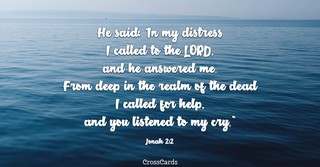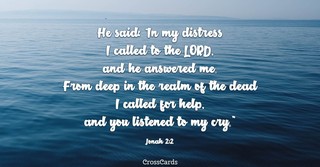- Recent Translations
- All Translations
Yuēnáshū 2
Share
Settings
Yuēnáshū 2 Commentary
Chapter 2
The prayer of Jonah. (1-9) He is delivered from the fish. (10)
Verses 1-9 Observe when Jonah prayed. When he was in trouble, under the tokens of God's displeasure against him for sin: when we are in affliction we must pray. Being kept alive by miracle, he prayed. A sense of God's good-will to us, notwithstanding our offences, opens the lips in prayer, which were closed with the dread of wrath. Also, where he prayed; in the belly of the fish. No place is amiss for prayer. Men may shut us from communion with one another, but not from communion with God. To whom he prayed; to the Lord his God. This encourages even backsliders to return. What his prayer was. This seems to relate his experience and reflections, then and afterwards, rather than to be the form or substance of his prayer. Jonah reflects on the earnestness of his prayer, and God's readiness to hear and answer. If we would get good by our troubles, we must notice the hand of God in them. He had wickedly fled from the presence of the Lord, who might justly take his Holy Spirit from him, never to visit him more. Those only are miserable, whom God will no longer own and favour. But though he was perplexed, yet not in despair. Jonah reflects on the favour of God to him, when he sought to God, and trusted in him in his distress. He warns others, and tells them to keep close to God. Those who forsake their own duty, forsake their own mercy; those who run away from the work of their place and day, run away from the comfort of it. As far as a believer copies those who observe lying vanities, he forsakes his own mercy, and lives below his privileges. But Jonah's experience encourages others, in all ages, to trust in God, as the God of salvation.
Verse 10 Jonah's deliverance may be considered as an instance of God's power over all the creatures. As an instance of God's mercy to a poor penitent, who in distress prays to him: and as a type and figure of Christ's resurrection. Amidst all our varying experiences, and the changing scenes of life; we should look by faith, fixedly, upon our once suffering and dying, but now risen and ascended Redeemer. Let us confess our sins, consider Christ's resurrection as an earnest of our own, and thankfully receive every temporal and spiritual deliverance, as the pledge of our eternal redemption.
Yuēnáshū 2 Commentaries
Chapter Summary
INTRODUCTION TO JONAH 2
This chapter contains the prayer of Jonah, when in the fish's belly; the time when he prayed, the person he prayed unto, and the place where, are suggested in Jon 2:1; and the latter described as a place of great straitness and distress, and even as hell itself, Jon 2:2; The condition he was in, when cast into the sea, and when in the belly of the fish, which is observed, the more to heighten the greatness of the deliverance, Jon 2:3-6. The different frame of mind he was in, sometimes almost in despair, and ready to faint; and presently exercising faith and hope, remembering the goodness of the Lord, and resolving to look again to him, Jon 2:4,7. The gracious regards of God to him, in receiving, hearing, and answering his prayer, and bringing up his life from corruption, Jon 2:2,6,7. His resolution, let others do what they would, to praise the Lord, and give him the glory of his salvation, Jon 2:8,9; and the chapter is concluded with the order for his deliverance, and the manner of it, Jon 2:10.


